Java 8 Read File in Chunks of Lines
Hello readers, in this tutorial, we will see an instance of how to Read a File Line by Line in Java viii. We volition learn the Java 8 Stream's API for reading a file's content line by line and we will explore its different characteristics.
i. Introduction
These days in the programming universe reading the file content is i of the most habitual file manipulation tasks in Coffee. In the aboriginal Coffee world, the code to read the text file line past line was very dull. In Java8, JDK developers have added new methods to the java.nio.file.Files course which has opened new gateways for the developers and these new methods offer an efficient reading of the files using the Streams.
Java8 has added the Files.lines() method to read the file data using the Stream. The attractiveness of this method is that it reads all lines from a file as a stream of strings. This method,
- Reads the file data only subsequently a Terminal operation (such as
forEach(),count()etc.) is executed on the Stream - Reads the file content line-by-line by using the Streams
- Works by reading the Byte from a file then decodes it into a Character using the
UTF-8character encoding
Do remember, Files.lines() is dissimilar from the Files.readAllLines() as the latter i reads all the lines of a file into a listing of String elements. This is not an efficient way as the complete file is stored as a List resulting in extra memory consumption.
Java8 also provides another method i.due east. Files.newBufferedReader() which returns a BufferedReader to read the content from the file. Since both Files.lines() and Files.newBufferedReader() methods return Stream, developers can use this output to carry out some extra processing.
At present, open upward the Eclipse Ide and nosotros will go over these methods to read a file line by line using the Java8 Lambda Stream.
2. Java 8 Read File Line by Line Instance
2.1 Tools Used
Nosotros are using Eclipse Oxygen, JDK 1.8, and Maven.
ii.2 Project Structure
Firstly, let’due south review the final project structure if you're confused nearly where you should create the corresponding files or folder later!
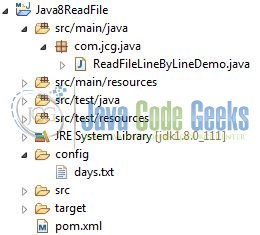
2.3 Project Creation
This section will show how to create a Java-based Maven project with Eclipse. In Eclipse IDE, become to File -> New -> Maven Project.
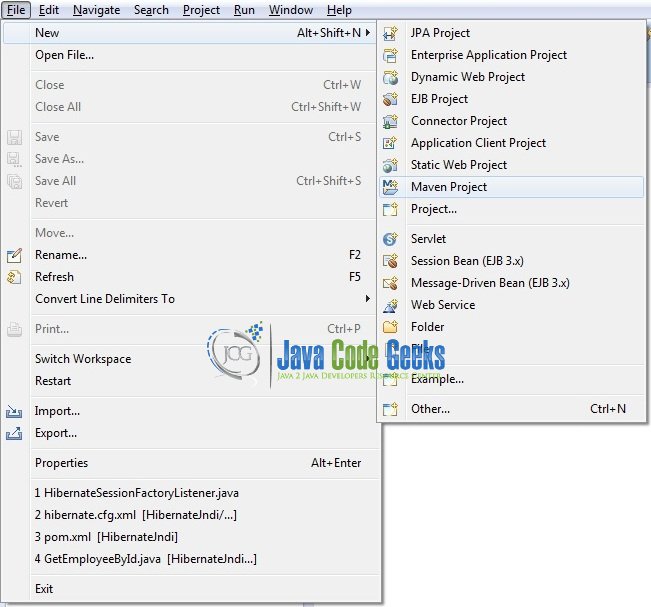
In the New Maven Project window, it will ask you to select the projection location. By default, 'Utilise default workspace location' will be selected. Select the 'Create a simple project (skip archetype choice)' checkbox and just click on the next push to go along.
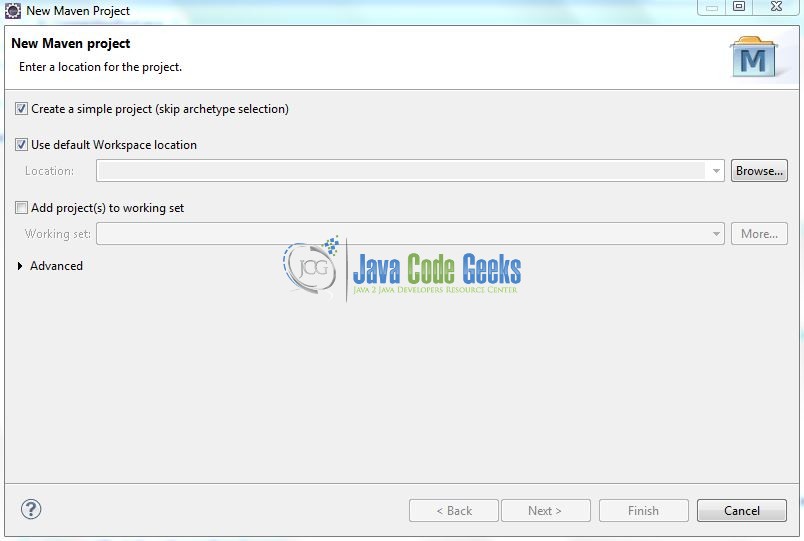
It volition ask you to 'Enter the group and the antiquity id for the project'. We will input the details as shown in the below prototype. The version number will be by default: 0.0.i-SNAPSHOT.
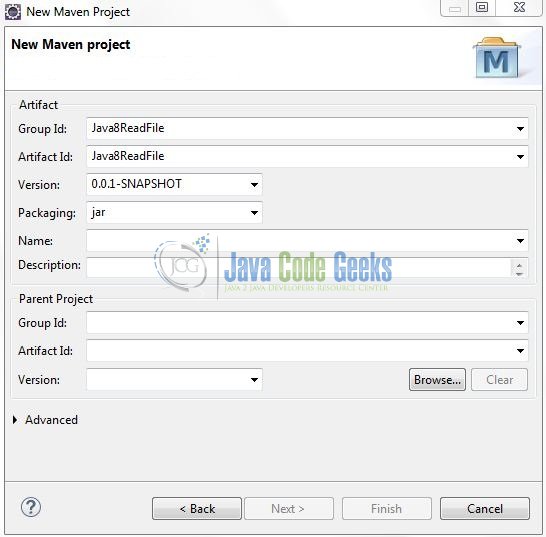
Click on Finish and the creation of a maven project is completed. If you meet, information technology has downloaded the maven dependencies and a pom.xml file volition exist created. Information technology will have the following lawmaking:
pom.xml
Developers can beginning adding the dependencies that they desire. Let u.s.a. offset building the application!
3. Application Building
Below are the steps involved in explaining this tutorial.
3.1 Java Class Implementation
Let'south create the required Java files. Right-click on the src/main/java binder, New -> Package.

A new pop window will open where we volition enter the package name as: com.jcg.coffee.
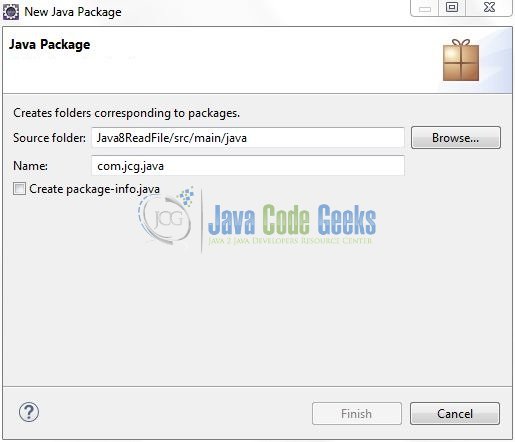
Once the package is created in the awarding, we will demand to create the implementation class to show the Files.lines() and Files.newBufferedReader() methods usage. Right-click on the newly created package: New -> Class.

A new pop window will open and enter the file name as: ReadFileLineByLineDemo. The implementation class volition be created within the package: com.jcg.java.
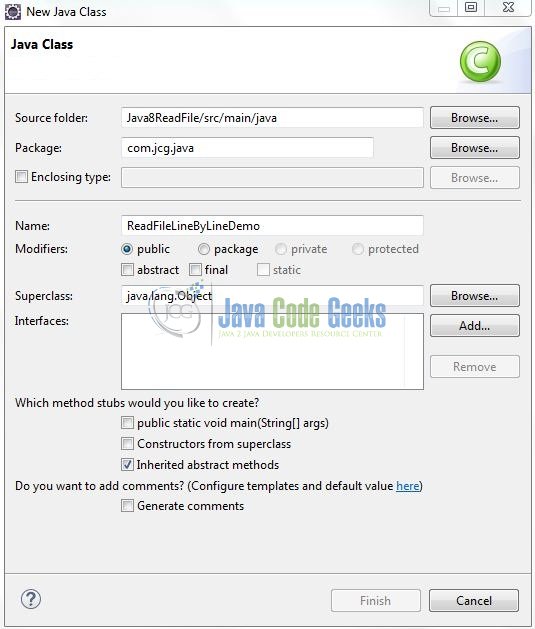
3.one.ane Example of Reading File in Java8
Here is the complete Java program to read an input file line by line using the Lambda Stream in Java8 programming. In this tutorial nosotros will talk about the three different approaches for reading a file:
- Approach 1: This approach (i.eastward.
fileStreamUsingFiles(……)talks about reading a file into Java8 Stream and printing it line by line - Arroyo 2: This approach (i.east.
filterFileData(……)) talks about reading a file into Java8 Stream (like the one we'll be using in Arroyo 1) but also apply a filter to information technology (i.e. Read only those elements from the file that starting time with an alphabet (s) and print it onto the console). This approach gives an border to use criteria while reading the file - Approach 3: This arroyo (i.e.
fileStreamUsingBufferedReader(……)talks nigh a new Java8 method known asBufferedReader.lines(……)that lets theBufferedReaderreturns the content every bitStream
Important points:
- In the above approaches, we accept omitted the try-with-resources concept for simplicity and mainly focused on the new ways of reading the file. Yet, just for developers curiosity endeavour-with-resource is a concept that ensures that each resource is closed at the cease of the argument execution
- With enhancements in Java and introduction to Stream in Java8, developers have stopped using the
BufferedReaderandScannerclasses to read a file line by line as it does not offering the facilities like the ones offered by Java8 Streams API
Let us move ahead and understand the 3 different approaches with a practical case.
ReadFileLineByLineDemo.coffee
| 01 02 03 04 05 06 07 08 09 10 eleven 12 13 xiv 15 16 17 xviii 19 20 21 22 23 24 25 26 27 28 29 30 31 32 33 34 35 36 37 38 39 40 41 42 43 44 45 46 47 48 49 50 51 52 53 54 55 56 57 58 59 60 61 62 63 64 65 66 67 68 | |
4. Run the Application
To run the awarding, developers need to right-click on the class, Run As -> Coffee Application. Developers can debug the example and meet what happens later on every step!
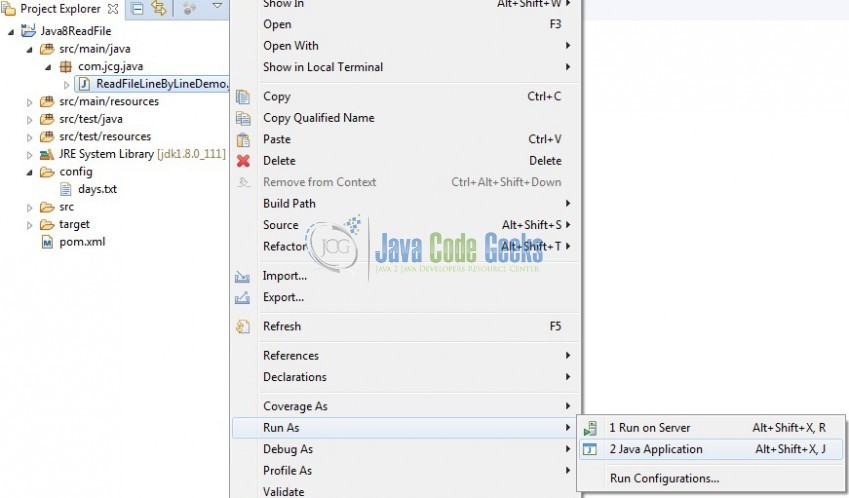
five. Project Demo
The above lawmaking shows the post-obit logs as output.
| 01 02 03 04 05 06 07 08 09 10 11 12 thirteen 14 xv 16 17 18 19 20 21 22 23 | |
That is all for this mail. Happy Learning!
6. Java Read File Line past Line – Summary
In this tutorial, we had an in-depth await at:
- Java eight
Files.lines()method in order to read a file line by line lazily and using the Stream API last operation (forEach(……)) to impress lines from the file - Coffee eight
Files.newBufferedReader()method in social club to read a file line by line. This method returns the contents as aStream - We likewise an introduction of Java viii Stream API methods to make ourselves familiar with this new concept
7. Download the Eclipse Project
This was an example of how to Read a File Line by Line in Java 8.
Last updated on April. 27th, 2020
Source: https://examples.javacodegeeks.com/java-read-file-line-by-line-example/
0 Response to "Java 8 Read File in Chunks of Lines"
Post a Comment